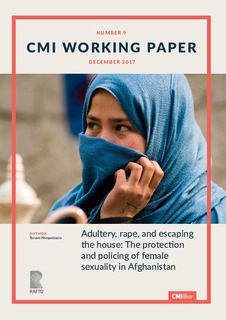Adultery, rape, and escaping the house: The protection and policing of female sexuality in Afghanistan
Working paper
Permanent lenke
http://hdl.handle.net/11250/2475482Utgivelsesdato
2017-12-01Metadata
Vis full innførselSamlinger
- Publications [1488]
Originalversjon
Bergen: Chr. Michelsen Institute (CMI Working Paper WP 2017:9) 16 p.Sammendrag
This working paper undertakes an initial survey of the dynamics through which the criminalization of female sexuality structures women’s access to protection against rape in Afghanistan, examining both legislation and legal practice. Given the relative dearth of existing research and material on this topic in Afghanistan (but see Latiff 2009; Tawfik 2009), this paper is necessarily preliminary in scope. It nonetheless puts forward three, interrelated arguments. Firstly, the paper argues that rape victims’ vulnerability to incrimination for zina (and the acute unpredictability about the grounds for incrimination) hinders their access to justice. Secondly, the paper argues that the zina–rape relationship in its narrow sense only partially addresses the nexus between the criminalization of female sexuality and protection against rape. A fuller appreciation of this nexus necessitates zooming out: initially to a peculiar Afghan legal practice—the detaining of women for “running away” from home—and then to how that practice blocks protection against a prevalent form of sexual violence in Afghanistan—forced marriage. Finally, the paper suggests that linkages between the protecting of women against sexual abuse and the policing of female sexual conduct must be understood in the context of a state whose default position has been to relegate female sexuality to family control, rather than to directly intervene. Thus, while the Afghan state has routinely prosecuted and detained women (as well as some men) for consensual sexual transgressions, it has not, by and large, sought to use the figure of the unchaste or immoral woman as a tool for expanding its power over society, in the way witnessed, for instance, in contemporary Iran and Sudan (as well as in Afghanistan during Taliban rule). Correspondingly, the state has also been a reluctant intervener in regulating coercive sexual crimes. In a number of high profile rape cases, t
